|
|
|
Sort Order |
|
|
|
Items / Page
|
|
|
|
|
|
|
| Srl | Item |
| 1 |
ID:
141467


|
|
|
|
|
| Summary/Abstract |
The proportion and visibility of Brazilian women and particularly the specific images of Brazil and Brazilians in the Portuguese imaginary have contributed to the construction of new versions of stigma and stereotypes surrounding them. Mainstream images of Brazilian women have incorporated prejudices about the sensuality of Creole women who are reminiscent of the Portuguese colonial imaginary. Starting from this stigmatised image, we show how Brazilian women entrepreneurs in the ‘beauty’ business filière reinterpret and mobilise this perceived negative image, transforming it into an added value associated with an ‘aesthetic’ Brazilian body culture. This idea of ‘body’ aesthetics becomes a business resource transformed into aesthetic–corporal capital, a key component of the Brazilian beauty business filière. Empirically, this research is based on qualitative elements, in particular 25 interviews with Brazilian women entrepreneurs of the beauty filière working in Portugal, collected for the project BELTS-W (Brazilian Entrepreneurial Links and Transnational Strategies – Women).
|
|
|
|
|
|
|
|
|
|
|
|
|
|
|
|
| 2 |
ID:
141466
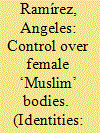

|
|
|
|
|
| Summary/Abstract |
Control of the female body is a key component of both the formation of Muslim identities and the control of Muslim communities in European countries. I will argue that the regulation of the clothing worn by Muslim women, both the restriction of its use (which occurs mainly in non-Muslim countries) and the requirement to wear a particular item, share the same goal: the control of women’s bodies. In this respect, I will consider both the legal regulations that require women to wear the so-called ‘Muslim’ clothing and those that restrict it as a way of disciplining the population, and will focus on the control of women as a privileged form of political control.
|
|
|
|
|
|
|
|
|
|
|
|
|
|
|
|
| 3 |
ID:
141465
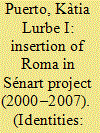

|
|
|
|
|
| Summary/Abstract |
Between 2000 and 2007, 34 Romanian families living in shanty towns in a Parisian suburb participated in a local group-specific social integration project. A socio-anthropological study was undertaken 2 years after it ended, including documentary analysis of its archives, interviews with its beneficiaries and the professionals involved and ethnography among three families with distinct integration histories. Using the analysis of the project’s implementation and outcomes, this article sheds light on how exceptional acts of minority identity recognition – sporadic and on a case-by-case basis – were ultimately functional in the performance of a republican redistributive policy on individual access to rights and resources based on the denial of racialised inequalities.
|
|
|
|
|
|
|
|
|
|
|
|
|
|
|
|
| 4 |
ID:
141469
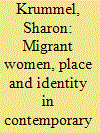

|
|
|
|
|
| Summary/Abstract |
While recent scholarship on migration has reflected growing attention to gender and to the intersectionality of race, gender and sexuality, there has been little focus on women’s emotional and bodily responses to migration in the context of larger structures of sexism, racism and the legacies of colonialism. In this paper, I examine some literary portrayals of how migrant women’s relationships with specific places of origin and settlement, both steeped in structural relationships of unequal power and experienced on an immediate, psychological and bodily plane, are fundamental to migrant women’s changing sense of belonging and identity. Jamaica Kincaid in her novel Lucy, Tsitsi Dangarembga in her novel Nervous Conditions and Dionne Brand in the opening poems of her volume No Language is Neutral evoke some of the complex ways in which migration can affect women’s lives and identities, thus both complementing and critiquing some contemporary theorisations of migration and migrant identities.
|
|
|
|
|
|
|
|
|
|
|
|
|
|
|
|
| 5 |
ID:
141470
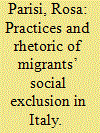

|
|
|
|
|
| Summary/Abstract |
The article aims to investigate the intersection of legislative dimensions, economic conditions and intimate life contributing to racialising and marginalising the poorest non-European migrants. First, this article focuses on the central role played by the private life in claiming citizenship rights and in building a sense of belonging within migratory contexts. As a result, mixed couples become a border zone through which the state disciplines immigrants according to their class, nationality and gender. On the other side, mixed couples and their intimate lives define resistance against the state’s biopolitical power to control people and become the space of intimate citizenship. Second, the article analyses the matrix for immigrants’ exclusion and differentiation embodied within the institutional and legislative system through immigration and citizenship laws. Therefore, the ‘coloniality power matrix’ becomes an active component of the naturalisation system of social differences at an institutional level.
|
|
|
|
|
|
|
|
|
|
|
|
|
|
|
|
| 6 |
ID:
141464
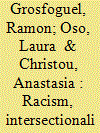

|
|
|
|
|
| Summary/Abstract |
The concept of ‘racism’ has faced many difficulties in migration studies. Depending on definitions, islamophobia is a form either of religious discrimination or of racism. The same is true in contemporary debates in Europe about xenophobia against immigrants from the Global South. This article provides an alternative way of thinking about racism and its relationship with questions of intersectionality and discusses the relationship of these issues to migration theory. In the first part, we discuss intersectionality in relation to Fanon’s definition of racism. Then, we establish a dialogue between the work of de Sousa Santos and Fanon that could enrich our understanding of intersectionality in the framework of modernity and the capitalist/imperial/patriarchal/racial colonial world-system. Finally, we analyse this discussion’s implications for migration theory, highlighting how migration studies tend to reproduce a northern-centric social science view of the world that comes from the experience of others in the zone of being.
|
|
|
|
|
|
|
|
|
|
|
|
|
|
|
|
| 7 |
ID:
141468
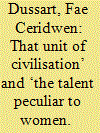

|
|
|
|
|
| Summary/Abstract |
Domestic servants across the British Empire were instrumental in constructing colonial domesticity. In metropole and colony, they marked the physical boundaries of the house and family and the categorical boundaries of class, gender and racial difference. However, in colonial India, the gender and racial status of Indian servants, relative to both their colonial employers and their metropolitan counterparts, disrupted the dynamics of dependence that structured metropolitan employer/servant relations and identities. Despite efforts to dutifully ‘civilise’ households according to a ‘British’ standard, the day-to-day reality was one in which ambivalence and uncertainty towards servants were commonplace among colonisers and where servants participated in the creation of a way of life that was specifically colonial, even while it sought to preserve and proselytise ‘Britishness’.
|
|
|
|
|
|
|
|
|
|
|
|
|
|
|
|
|
|
|
|
|